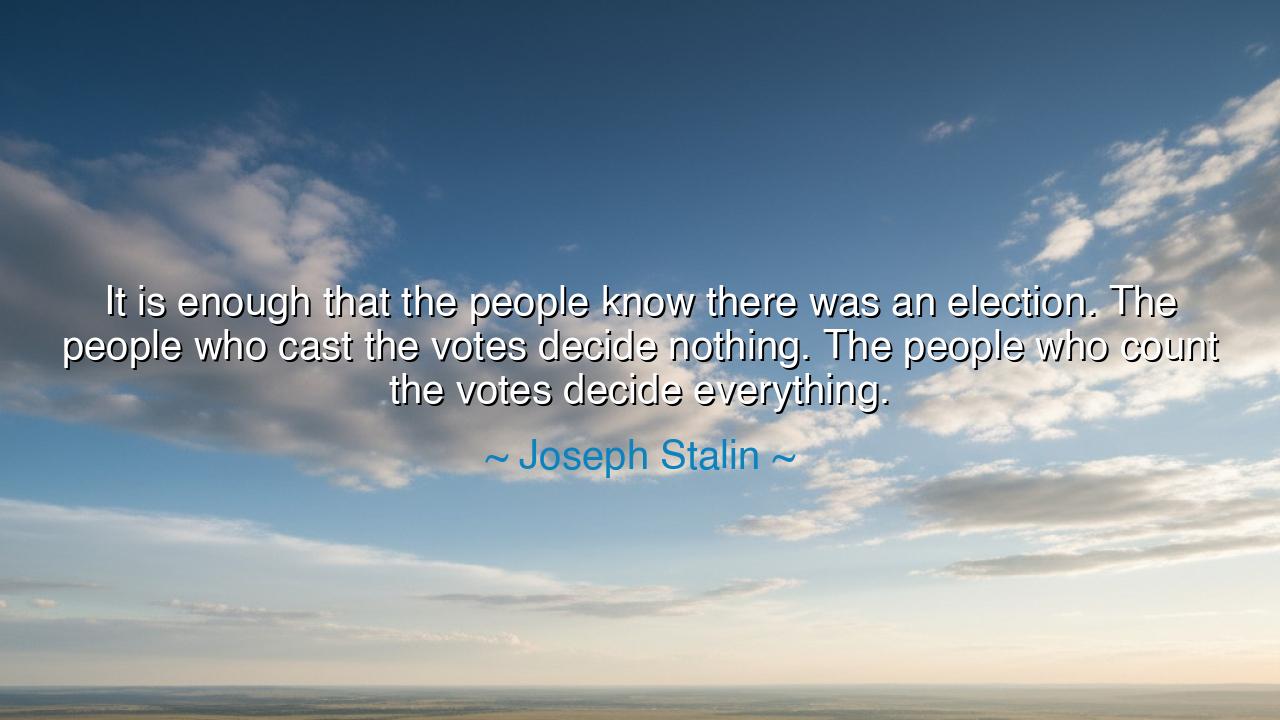
It is enough that the people know there was an election. The
It is enough that the people know there was an election. The people who cast the votes decide nothing. The people who count the votes decide everything.






The words of Joseph Stalin, “It is enough that the people know there was an election. The people who cast the votes decide nothing. The people who count the votes decide everything,” echo with the iron voice of tyranny. In them lies the dark wisdom of a ruler who understood that power does not rest in appearances, but in control. To the crowd, he offered the illusion of choice, but behind closed doors, he revealed the truth—that sovereignty belongs not to the voter, but to the hand that tallies.
In the ancient spirit, this truth is both a warning and a lament. For the ritual of elections has long been used as a mask, a theater to calm the people with the illusion of liberty while denying them its reality. Just as false priests once pretended to hear the gods to keep the faithful in submission, so too do false rulers allow the people to vote, while ensuring the outcome is predetermined. Stalin’s words strip away the mask and show the machinery of control: the count is greater than the casting.
Consider the tale of the Soviet Union itself, where Stalin presided over elections that offered only one candidate, one party, one choice. Ballot boxes were filled, but the results were foreordained. To the world, it seemed as though the people had spoken; but in truth, their voices had been silenced before they were ever raised. This was the embodiment of his chilling proclamation—that it mattered little what the people wished, only what was declared in their name.
Yet history also tells of those who resisted such corruption. In the Philippines, during the 1986 election, Ferdinand Marcos attempted to manipulate the count, declaring victory even as the people knew it false. But mass protests, the “People Power Revolution,” rose in defiance, and his deceit could not stand. Here we see the counter to Stalin’s bleak wisdom: that when citizens awaken, even the most carefully controlled counts can be overturned by the force of unity and truth.
So let this teaching endure: democracy is not safeguarded by the act of voting alone, but by the vigilance that protects the count. To guard the tally is to guard the soul of liberty. Stalin’s words reveal the danger of complacency, the ease with which freedom can become theater. Let future generations remember—appearances of choice are not enough; it is truth in action that keeps a nation free.






TPngoc thao phan
Stalin’s statement is chilling in its frankness, highlighting the potential dangers in a political system where the outcome is determined not by the voters, but by those in charge of the process. In today’s world, how much of this rings true? In some countries, it seems like the election results are almost pre-determined by powerful elites or institutions. How do we ensure that the counting process remains free from corruption and manipulation?
LVChuong Luong Van
This quote seems to embody the idea that in certain regimes, elections are a mere formality designed to give the illusion of democracy, while the true decision-making power remains behind the scenes. In the context of modern elections, how much control do the people really have over the outcome? With allegations of election tampering and fraud, can we ever be sure that every vote is counted fairly?
THThanh Huong.23
Stalin’s words expose the dark side of political systems that claim to be democratic. What’s the point of having elections if the real power lies in the hands of those who control the results? Is this why voter suppression and election interference are such threats to democracy? It makes me question how transparent and fair our own systems are in reality, and whether power truly rests with the people.
VQ33_Nguyen Van Quang_10A3
Stalin’s quote seems to reflect a cynical view of the democratic process, suggesting that elections are meaningless unless the people in control of the vote count have the real power. It raises a crucial question about the integrity of elections: Can democracy truly thrive when the system is so easily manipulated by those in power? How often do we see instances where the process of counting votes or the influence over the count undermines the will of the people?